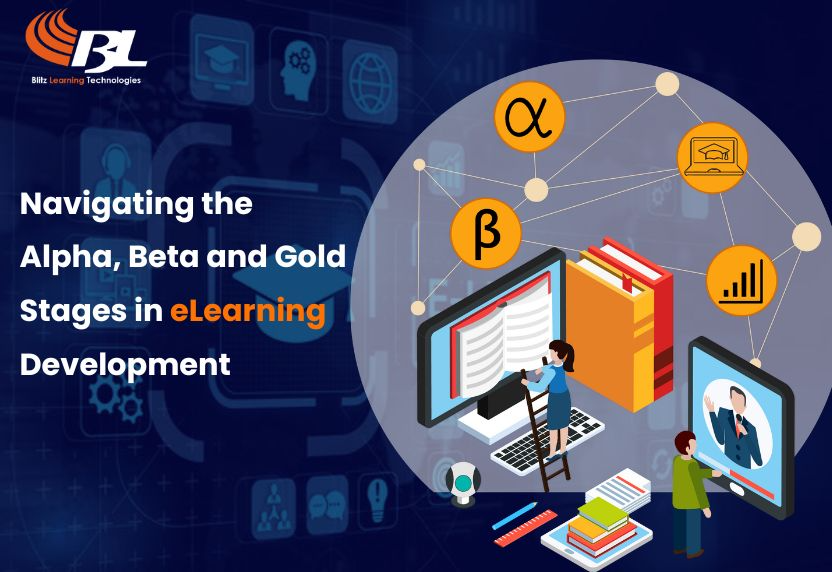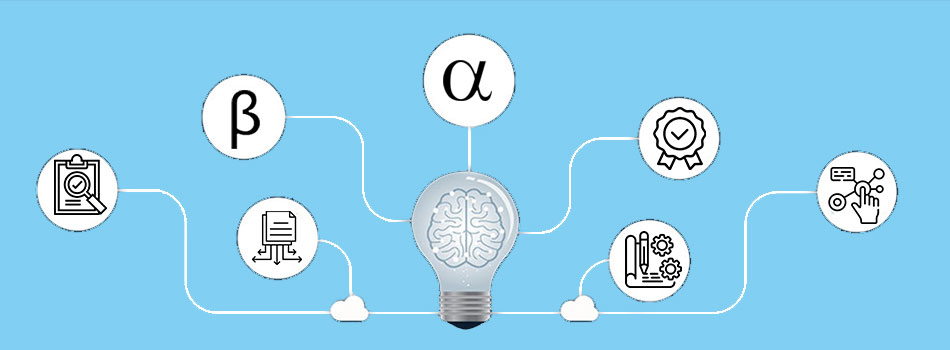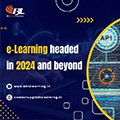
Blog
- Home
- Blog

06May
Navigating the Alpha, Beta, and Gold Stages in eLearning Development
Introduction:
In the ever-evolving landscape of education, eLearning has emerged as a formidable force, offering flexibility, accessibility, and innovation to learners worldwide. However, behind the seamless interface and engaging content lies a meticulous process of development. Navigating through the alpha, beta, and gold stages of eLearning development is crucial for ensuring the quality and effectiveness of online educational experiences.
Understanding the Development Stages:

Alpha Stage:
The alpha stage marks the initial phase of eLearning development. At this stage, developers focus on creating a rudimentary version of the course content. It's akin to laying the foundation of a building – basic yet essential. Key objectives during the alpha stage include.
Content Outline: Developers outline the structure of the course, including learning objectives, modules, and assessments. This serves as a blueprint for the entire development process.
Content Creation: While not exhaustive, content creation begins in the alpha stage. Developers draft initial lesson plans, compile resources, and outline the narrative flow of the course.
Beta Stage:
The beta stage represents a significant milestone in eLearning development. Here, the focus shifts towards refining and enhancing the course based on feedback received during the alpha stage. Key activities in the beta stage include:
Content Refinement: Based on feedback from stakeholders, subject matter experts, and early testers, developers refine the course content to improve clarity, relevance, and effectiveness.
Interactive Elements: Interactive elements such as quizzes, simulations, and multimedia assets are integrated into the course to enhance learner engagement and comprehension.
User Testing: Beta testing involves conducting usability tests with a select group of users to identify any technical issues, bugs, or usability challenges. Feedback gathered from beta testers is instrumental in fine-tuning the course before its official launch.
Gold Stage:
The gold stage signifies the final phase of eLearning development, where the course is polished and prepared for deployment. Key objectives in the gold stage include:
Quality Assurance: Rigorous quality assurance checks are conducted to ensure that the course meets established standards for functionality, performance, and accessibility across various devices and platforms.
Content Finalization: The course content is finalized, including text, graphics, audio, and video components. Any remaining revisions or updates are implemented to ensure accuracy and relevance.
LMS Integration:
The course is integrated with the Learning Management System (LMS) or eLearning platform through which it will be delivered. This involves configuring settings, uploading content, and testing compatibility with the chosen platform.
Best Practices for Navigating the Development Stages:
Collaborative Approach: Foster collaboration between instructional designers, subject matter experts, graphic designers, and developers to leverage diverse expertise and perspectives throughout the development process.
Iterative Design: Embrace an iterative design approach, where feedback loops are incorporated at each stage of development to continuously refine and improve the course content and functionality.
User-Centered Design: Prioritize the needs and preferences of the end-users (learners) throughout the development process. Conduct user research, usability testing, and surveys to gather insights and tailor the course to the target audience.
Agile Methodology: Adopt agile project management methodologies, such as Scrum or Kanban, to facilitate flexibility, adaptability, and rapid iterations during eLearning development.
Accessibility Compliance: Ensure that the course content is accessible to learners of all abilities by adhering to accessibility standards such as WCAG (Web Content Accessibility Guidelines) and incorporating features such as alternative text for images, closed captions for videos, and keyboard navigation options.
Continuous Improvement: Recognize that eLearning development is an on-going process rather than a one-time project. Encourage continuous evaluation, feedback, and updates to keep the course content relevant and effective over time.
Conclusion:
Navigating the alpha, beta, and gold stages in eLearning development requires careful planning, collaboration, and attention to detail. By following best practices and embracing an iterative design approach, developers can create high-quality, engaging, and effective online learning experiences that empower learners to achieve their educational goals. As technology continues to evolve and new pedagogical approaches emerge, staying adaptable and responsive to change will be key to driving innovation in eLearning development.

Neha Tyagi
About authorAs a Digital Tech professional with significant experience, Neha Tyagi has mastered the art of teamwork. Throughout her career, she maintains a commitment to continuous learning. Currently, Neha is delving into innovative technologies aimed at transforming businesses.



Leave a comments